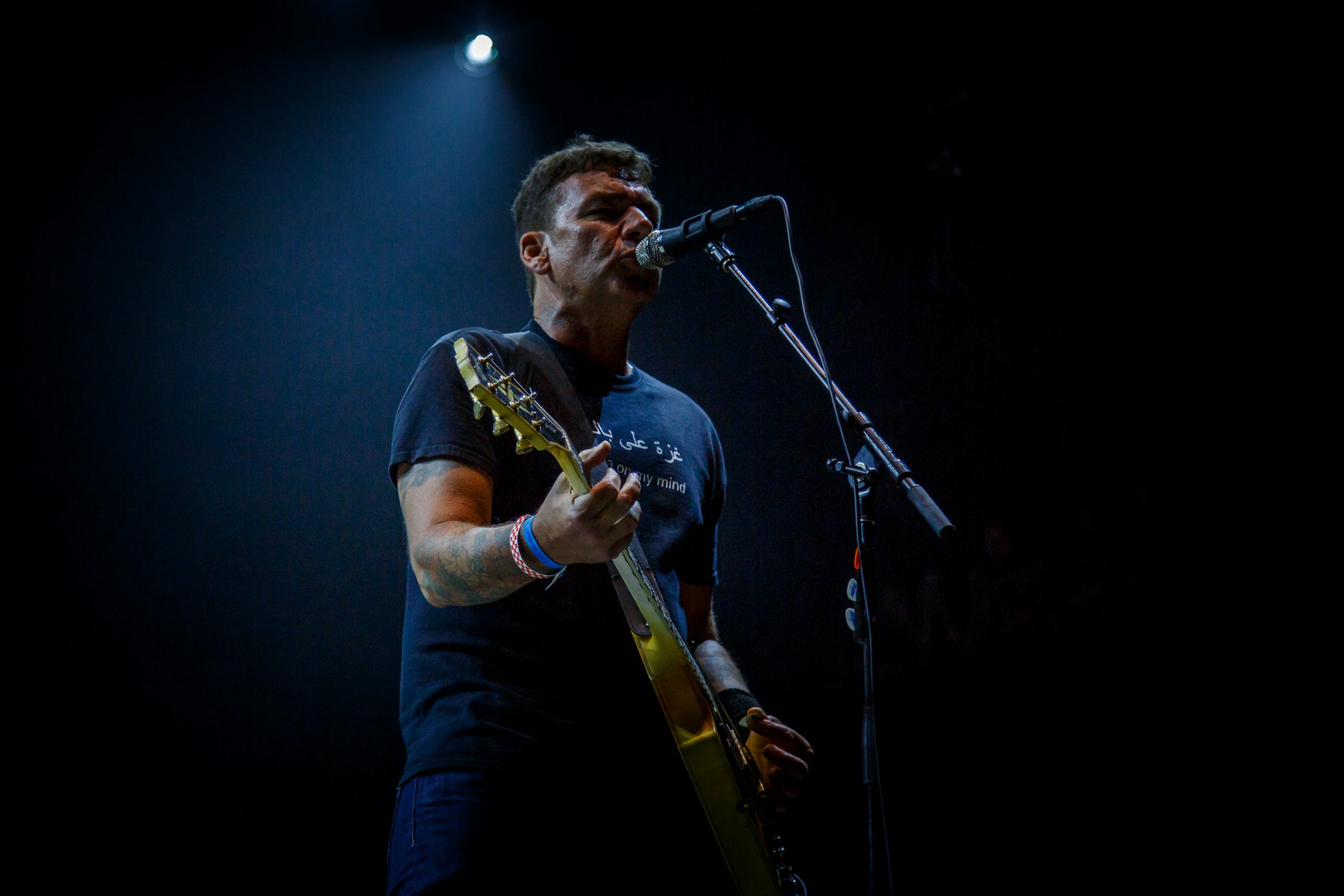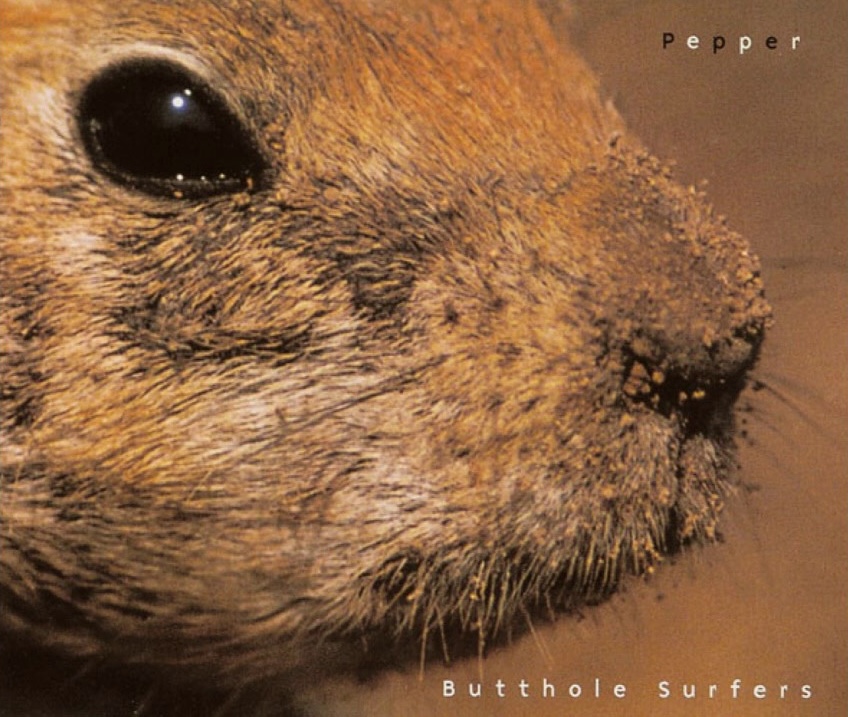It began the only way it could have begun. It began with "Boxcar."
As Blake Schwarzenbach sang his immortal rejoinder to the punker-than-thou types that once shunned him in front of the largest audience ever gathered together to see his band, Jawbreaker, a field of people screamed the "1, 2, 3, 4/ Who's punk? What's the score?" refrain. When the crowd hit every beat of that chorus like their life depended on it, it seemed that tonight, at least, Jawbreaker had finally hit the big time, 20 years after splitting up.
Since their acrimonious (and apparently fist-fight-fueled) break-up in 1996, the punk trio had seemed firmly in the "yeah, that's not going to happen" reunion category, alongside their spiritual predecessors the Smiths and Hüsker Dü (R.I.P. Grant). There have been rumors of reunion offers from the big festival before, and there have been rumors as to why Schwarzenbach has resisted, and he's frequently said he didn't think he was physically capable of doing the songs justice. So when Riot Fest announced last spring that the band had finally pulled the trigger and decided to headline the third and climactic night of the three-day festival -- the same slot previously occupied by similar no-chance-in-hell reunions by the Misfits and the Replacements -- the band's dedicated fans, at least half of whom were born after the band broke up, worried about two things: 1) Would the band even sound good? 2) Would it at all seem like Schwarzenbach wanted to be there? (We've all seen enough half-hearted reunions to know how much it hurts to watch a begrudging artist toil contemptuously through the motions.)
I'm thrilled to point out that it was a yes on both counts. Bassist Chris Bauermeister and drummer Adam Pfahler haven't played as often as Schwarzenbach and his various bands over the years, but everyone clearly put the time in to nail the tricky changes in "Parabola" and make sure that "Jet Black" purred and soared. And though Schwarzenbach's default is always going to be done dry and antagonistic (the first bit of between-song stage banter was: "Everyone call into work tomorrow, general strike, because fuck this country"), you could see a bit of a smile in the corner of his mouth as the audience chanted the "aya-ya-ya/ I want you" parts of "Want." And when he told the crowd they were "honored to play for them" only to correct himself and insist they were "humbled to play for them," it seemed sincere. Perhaps he was touched to know his songs of longing and pain, of feeling like an outcast in the mainstream and underground, had finally found the audience they deserved.
Though they didn't quite pull in the so-packed-you-can-barely-walk crowds that gathered for Nine Inch Nails and Wu-Tang Clan, it was still an impressively large gathering for a band that never really had a radio hit in their prime, only to later be retconned as both punk-cred martyrs and emo godfathers. The crowd, both the people in the field and the huge throng of family members and famous fans assembled behind the band onstage, was ecstatic for every song (the setlist pulled from their entire career, with an emphasis on Dear You and 24 Hour Revenge Therapy), and if pointing at the stage and screaming is any indication -- and of course it is-- if the Dear You cut and set highlight "Accident Prone" had been released as a single in 1995, this band could have had a much different career.
Schwarzenbach, with his gruff but inviting vocals and weathered air, has finally aged into the wizened old man he capably gestured at in his 20s, and Bauermeister's anti-fascist action t-shirt showed that these guys remain close to their Oakland lefty roots. But as compelling as they were to watch, the audience reaction shots portrayed on the screen behind them were some of the most memorable parts of the evening, from the bearded guys just bawling during "Condition Oakland" to the kids who probably have to go to class tomorrow making mooney faces at each other during "Kiss The Bottle."
After "Save Your Generation," Schwarzenbach announced they were entering the "adult" portion of the evening, and as they kicked off the swirling eruption of "Million," it was a welcome reminder that this band was just entering its prime and figuring out how to make dramatic, complex portraits of inner turmoil right when they pulled the plug; even these more nuanced moments landed hard. It's hard to imagine that Jawbreaker could have played anything that wouldn't have been rapturously received, though I suppose I should thank them for not playing "Do You Still Hate Me?" as I probably would have had to be carried away in a stretcher after that one.
When the evening ended with "Bivouac," Schwarzenbach tore off his monitor and began mangling his guitar. Then he returned to the microphone so the audience could chant the titular refrain as one. He then thanked them as Pfahler stood on the drum riser and hurled his sticks into the crowd, a rock star move he had more than earned.
The reappraisal of Jawbreaker happened long ago, shortly after every emo outfit that earned a following, for good or for ill, began name-checking them. If anything, that reappraisal didn't go far enough. Last night proved Jawbreaker were always just a great American rock band, period: funny and humane, vicious and fun. For a band as suspicious of big-punk machinery as this trio, one that ultimately fell apart as they became trapped in the nether region between punk acrimony and alt-world indifference, it seemed oddly fitting that they returned as conquering heroes by playing to a throng of listeners born too late to care about cred issues and older fans just happy to hear "Condition Oakland" one more time. After all, what's so wrong with a stupid happy audience?






